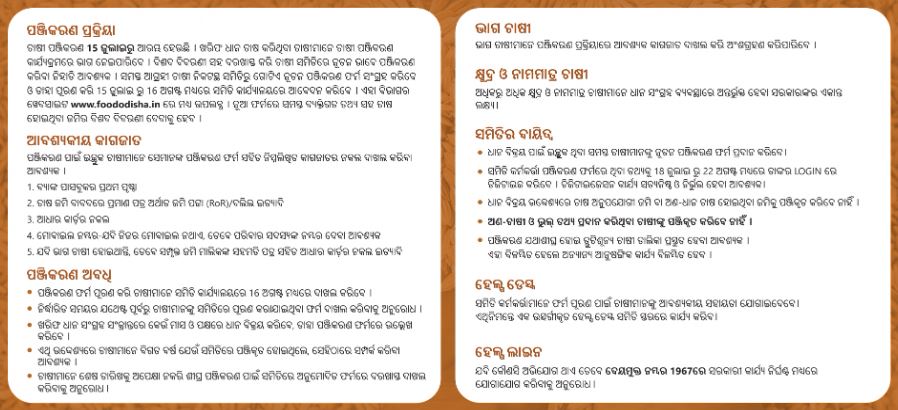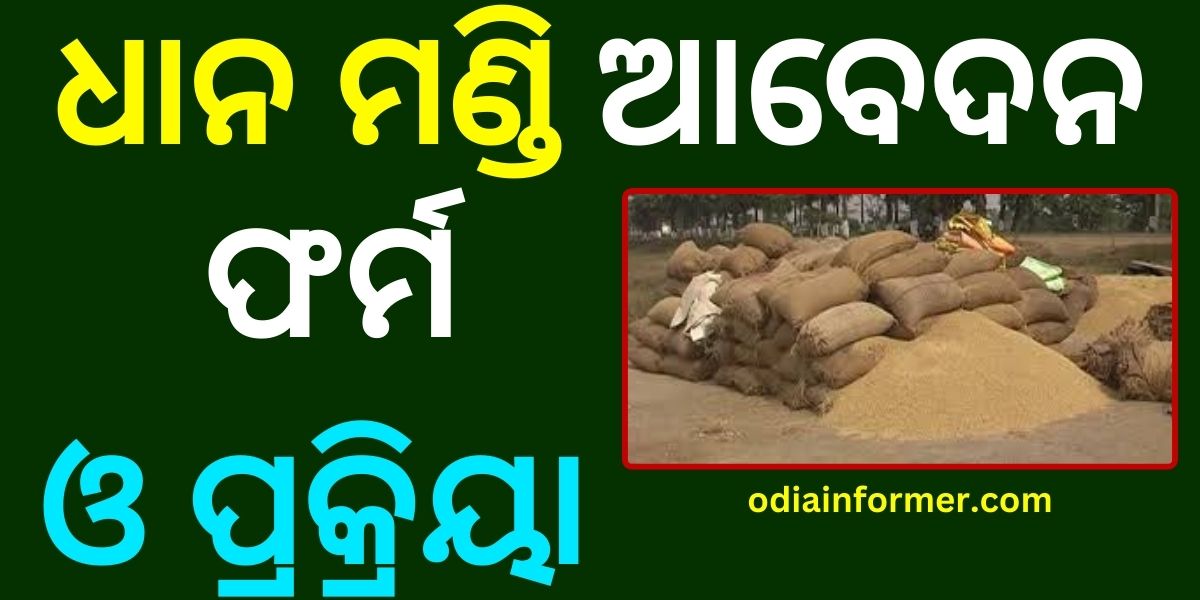This blog explores the key aspects of farmer registration for “Dhana Mandi,” its significance, and the steps involved, offering insights into how this initiative is transforming agriculture in Odisha.
In Odisha, the agricultural sector is the backbone of the state’s economy, with rice being a staple crop cultivated by millions of farmers. To streamline the cultivation, procurement, and payment processes for paddy (known locally as “Dhana”), the government has implemented a comprehensive farmer registration system.
What is Dhana Mandi?
“Dhana Mandi” refers to the process through which the government of Odisha procures paddy directly from farmers during the Kharif and Rabi seasons.
Paddy procurement is part of the broader Public Distribution System (PDS) aimed at ensuring food security. The government, through its agencies, purchases paddy from registered farmers at Minimum Support Price (MSP).
This system not only stabilizes farmers’ income but also ensures the availability of rice for distribution to needy families. Farmer registration is a critical part of this process as it creates a reliable database, ensuring transparency and direct access to government support.

| Paddy Registration Official Document Guide | CLICK HERE |
| Download Paddy Registration Form | CLICK HERE |
Why Farmer Registration is Important
Farmer registration under the Dhana Mandi initiative is crucial for several reasons:
1. Eligibility for MSP: Only registered farmers are eligible to sell their produce to the government at the MSP, ensuring they receive a fair price for their paddy.
2. Financial Inclusion: Registration enables direct transfer of payments to farmers’ bank accounts, cutting out intermediaries and ensuring timely payments.
3. Streamlined Procurement Process: Registration allows the government to maintain accurate records of paddy production, making the procurement process more efficient and preventing fraudulent activities.
4. Access to Government Schemes: Registered farmers are often eligible for additional benefits and support, such as subsidies on seeds, fertilizers, and irrigation equipment.

Eligibility Criteria for Farmer Registration in Dhana Mandi
To participate in the Dhana Mandi procurement process, farmers need to meet certain eligibility criteria:
Land Ownership: The farmer must own agricultural land in Odisha and have valid documentation proving ownership or tenancy rights.
Active Cultivation: The farmer must actively cultivate paddy on the registered land during the Kharif or Rabi seasons.
Aadhaar Linkage: Farmers must have their Aadhaar card linked to their bank accounts to receive payment.
Bank Account: A valid bank account is mandatory to ensure direct payment under the Direct Benefit Transfer (DBT) system.
Identity Proof: Farmers must provide valid identity proof such as Voter ID, Aadhaar card, or ration card during registration.
StepbyStep Process for Farmer Registration
1. Online Registration Portal:
The government has launched an online portal where farmers can register for Dhana Mandi. The portal is user friendly and can be accessed via any internet enabled device.
Farmers need to visit the official website of the Food Supplies and Consumer Welfare Department, Odisha, to initiate the registration process.
2. Creating a Profile:
Farmers need to create a profile by providing basic details such as their name, contact number, Aadhaar number, and bank account details.
It is crucial that all details are accurate to avoid delays in registration and payment.
3. Land Verification:
Farmers must provide details of their agricultural land, including the land record number and area under cultivation.
Land records are verified through the government’s digitized system to ensure transparency and accuracy.
4. Upload of Documents:
Farmers are required to upload scanned copies of necessary documents such as land ownership papers, identity proof, and bank passbook.
5. Aadhaar and Bank Account Linkage:
The portal requires farmers to link their Aadhaar card with their registered bank account. This step is essential for ensuring seamless transfer of funds postprocurement.
6. Approval Process:
Once all details and documents are submitted, the application is verified by the concerned authorities. Upon successful verification, the farmer’s registration is approved, and they are issued a unique registration number.
7. Token Generation for Paddy Sale:
Registered farmers are issued a token, which allows them to sell their paddy to designated procurement centers during the procurement season.
Offline Registration Process
For farmers without access to the internet, offline registration is also available:
1. Visit the Nearest PACS:
Farmers can visit their nearest Primary Agricultural Credit Society (PACS) office or the Mandal Revenue Office for assistance with registration.
2. Submission of Documents:
The required documents, such as land records and identity proof, can be submitted at these offices. The officials help farmers fill out the necessary forms and complete the process.
3. Verification and Approval:
The PACS verifies the documents and forwards the application for approval. Once approved, the farmer receives their registration ID and is eligible to sell paddy at government procurement centers.
Benefits of Dhana Mandi Farmer Registration
1. Fair Pricing: Farmers receive MSP for their paddy, safeguarding them from the fluctuations of the open market, where prices may dip below cost of production.
2. Timely Payment: Registered farmers receive payments directly into their bank accounts, ensuring transparency and preventing delays caused by middlemen or bureaucratic red tape.
3. Insurance and Support: Farmers registered under this system are often eligible for crop insurance and other statesponsored schemes aimed at reducing risk.
4. Transparency: The digitization of records and online registration minimizes the risk of fraudulent entries, ensuring only genuine farmers benefit from government procurement programs.
5. Ease of Access: The option for both online and offline registration ensures that all farmers, regardless of their access to technology, can participate in the Dhana Mandi scheme.
Challenges and Concerns
While the Dhana Mandi farmer registration system is robust and beneficial, a few challenges remain:
Digital Literacy: Many farmers in remote areas still face difficulties in using online systems due to a lack of digital literacy or access to reliable internet connections.
Land Ownership Disputes: In some cases, disputes over land ownership can delay the registration process, as proper documentation is required for verification.
Payment Delays: Although the system is designed for timely payments, occasional delays occur due to technical glitches or administrative hurdles.
Middlemen Influence: Despite efforts to remove intermediaries, in some cases, farmers still rely on middlemen to complete registration, which can reduce transparency and increase costs for the farmer.
Conclusion
The Odisha Farmer Registration for Dhana Mandi is a vital initiative that ensures farmers get fair prices for their paddy while streamlining the procurement process. By embracing technology, the state government has improved transparency and accountability, enabling farmers to participate in government schemes with ease.
Although challenges remain, ongoing efforts to improve access and resolve issues will further strengthen the system, ensuring that every farmer in Odisha benefits from this important program.
With the proper implementation of this registration system, Odisha is not only safeguarding its farmers but also taking strides toward a more efficient, fair, and sustainable agricultural economy.
Read Also:

